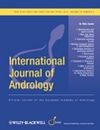Kisspeptin, the product of the KISS1 gene, plays an essential role in the regulation of spermatogenesis acting primarily at the hypothalamic level of the gonadotropic axis. However, the presence of kisspeptin and its canonical receptor, KISS1R, in spermatozoa has not been explored nor the direct effects of kisspeptin on sperm function have been studied so far. In the present study, we analysed the expression of kisspeptin and its receptor in sperm cells by western blot and immunocytochemistry assays and evaluated the effects of exposure to kisspeptin on sperm intracellular Ca(2+) concentration, [Ca(2+)]i, sperm motility, sperm hyperactivation and the acrosome reaction. Changes in [Ca(2+)]i were monitored using Fura-2, sperm kinematic parameters were measured using computer-assisted sperm analysis (CASA), and the acrosome reaction was measured using fluorescein isothiocyanate-coupled Pisum sativum agglutinin lectin (FITC-PSA method). We found that kisspeptin and its receptor are present in sperm cells, where both are mainly localized in the sperm head, around the neck and in the flagellum midpiece. Exposure to kisspeptin caused a slow, progressive increase in [Ca(2+)]i, which reached a plateau about 3-6 min after kisspeptin exposure. In addition, kisspeptin modulated sperm progressive motility causing a biphasic (stimulatory and inhibitory) response and also induced transient sperm hyperactivation. The effects of kisspeptin on sperm motility and hyperactivation were inhibited by the antagonist of KISS1R, peptide 234. Kisspeptin did not induce the acrosome reaction in human spermatozoa. These data show for the first time that kisspeptin and its receptor are present in human spermatozoa and modulate key parameters of sperm function. This may represent an additional mechanism for their crucial function in the control of male fertility.
Lea la entrevista con Antonio Cejudo Román



 English
English